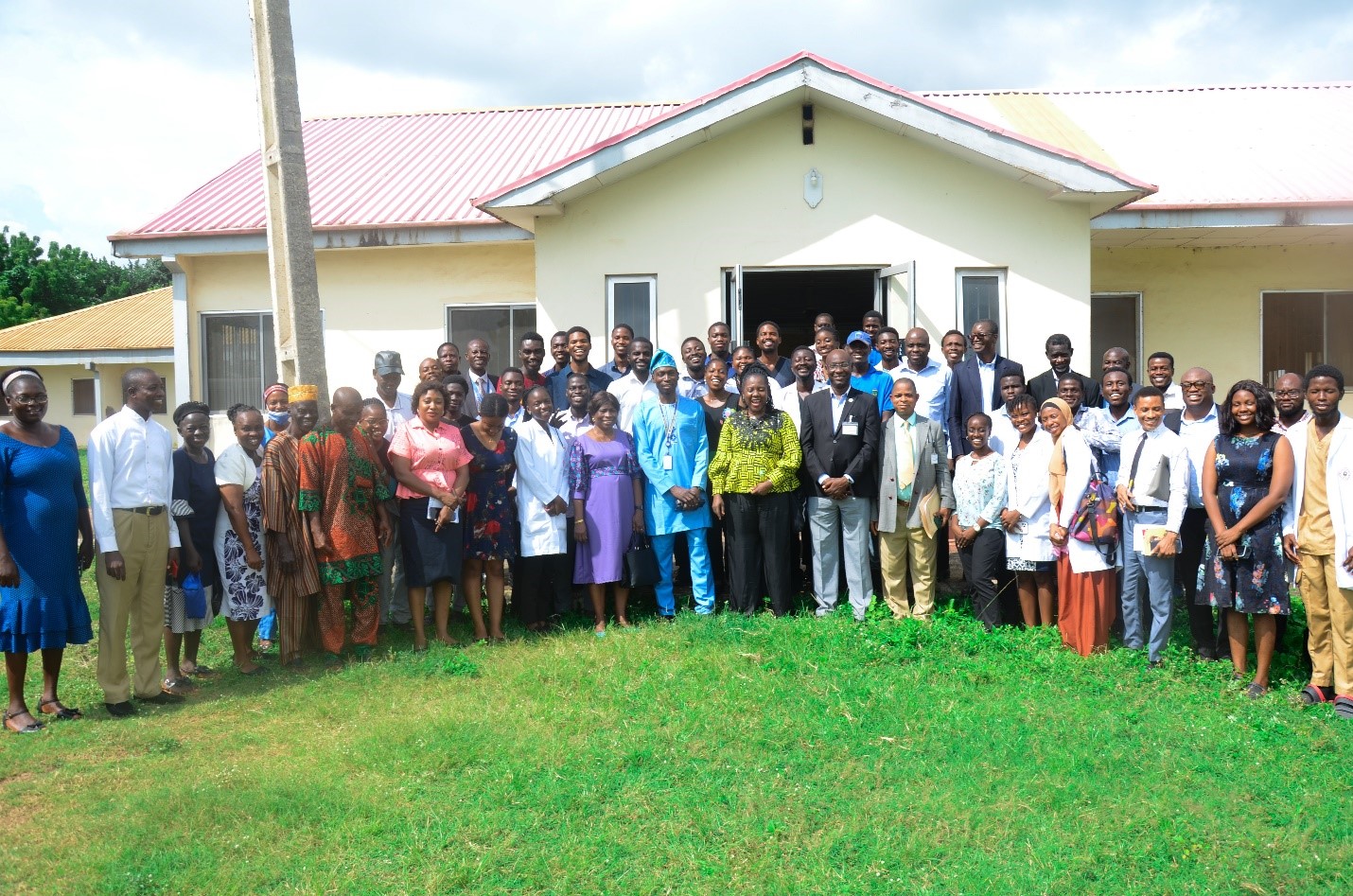On September 21, 2023, the Management Team of the College of Medicine, University of Ibadan, paid a visit to staff and students at the Ibarapa Community Project in Igbo-Ora. The visit was led by the Provost in the company of the Deputy Provost, Professor A.F. Adeniyi; Secretary to the College, Mr. Emmanuel Odedele; Financial Controller, Mr. Samson Ayansina; College Librarian, Dr. Grace Ajuwon; and other administrative members of staff of the College of Medicine, University of Ibadan.
If there is an urgent need to spurn rust to gold, Igbo-Ora is the untapped canvas waiting to be transformed into a haven of beauty and prosperity, but only if its potential is quickly harnessed now.
This was the message of the Provost of the College of Medicine, University of Ibadan (CoMUI), Professor Olayinka Omigbodun FAS, on the College leadership's official visit to Igbo-Ora.
A Brief Background to the Ibarapa Community and Primary Health Care Programme
The Ibarapa Community and Primary Health Care Programme is a pioneering initiative led by the collaborative efforts of two visionary leaders, the late Emeritus Professor Theophilus Oladipo Ogunlesi (the first Nigerian Professor of Medicine, and the First Emeritus Professor of Medicine, University of Ibadan) and the late Professor Alexander Brown. This vision laid the foundation for community-based medical education and health services in Africa. Initially conceptualised as the Ibarapa Project, it was established through a collaborative effort involving the University of Ibadan, the Oyo State Ministry of Health, the University College Hospital, the Local Governments in Ibarapa Division (Ibarapa East, Central and North) and, of course, the community.
A generous seed funding from the Rockefeller Foundation facilitated the creation of the programme's base campus, situated on 43.605 hectares of land in Igbo-Ora. This was complemented by technical support to medical staff that was provided by the Liverpool School of Tropical Medicine and the London School of Tropical Medicine and Hygiene. The land was donated by the community around an existing State Government Health Care Centre which became the hub of operations. The mini campus, located in Igbo-Ora, one of the largest of Ibarapa's seven towns and several villages and hamlets, is situated approximately 85 kilometres from Ibadan, the state capital.
The project's three specific objectives, as reiterated in the 25th-anniversary book, were as follows:
- To teach medical students and doctors, through practical work, the principles, and practices of community medicine.
- To study the problems of health care delivery in the Ibarapa Community and to develop the health services of the district into a model of what an integrated local health service should be, in collaboration with the Government of Western Nigeria and in a manner that can be applied to other districts in Nigeria and other developing countries.
- To carry out research into various aspects of health and disease in the community and thus to build up a body of knowledge on the various factors which are involved in health promotion and disease prevention.
Over the years, the programme aims to bridge the gap between medical and health science training and the pressing needs of African communities. It has provided a unique learning environment where students could gain practical experience and insight into community medicine, aligning academic pursuits with the realities of healthcare delivery in Africa. Over the years, the programme has evolved into a multifaceted initiative, hosting a diverse array of medical and health science students, including those from the University of Ibadan and international institutions seeking electives in community health and tropical medicine.
Under the guidance of the Director and Coordinator of Studies, resident doctors, environmental health specialists, and health visitors, alongside visiting consultants and medical staff from various departments, students receive comprehensive training and supervision for almost 2 months. This collaborative approach ensures a holistic educational experience that encompasses not only medical expertise but also an understanding of the social, economic, and cultural factors influencing health outcomes in the community.
Since its establishment, the Ibarapa Project has facilitated a diverse range of educational experiences for students from various disciplines. Specifically:
a) Medical students from the University of Ibadan have undertaken over 200 community health postings, each lasting 6-8 weeks.
b) Dental students from the University began annual postings in Ibarapa in 2007.
c) Masters and diploma students from the African Regional Health Education Centre regularly interned in Ibarapa for three-month periods between 1978 and 2000.
d) Community health officers in training at the University College Hospital have completed approximately 23 annual postings.
e) Nursing students from UCH were frequently posted to Ibarapa during the 1970s.
f) The UCH Schools of Midwifery and Peri-operative Nursing have annually sent their students since 1987 and 2006, respectively.
g) Since 1993, the former School of Hygiene, Eleyele, has utilized Ibarapa for the training and field experience of its community health extension workers.
Additionally, students from various countries, including America, Europe, Canada, the Netherlands, Britain, and Finland, regularly made visits in the past to the Ibarapa Community Project for exposure to community health and tropical medicine.
The educational process is facilitated by a team comprising the Director and Coordinator of Studies, resident doctors, environmental health specialists, and health visitors. They are supported by visiting consultants and resident medical staff from the College of Medicine, University College Hospital, and other departments. The official oversight of the programme falls under the office of the Provost of the College of Medicine, University of Ibadan, through the Dean of the Faculty of Clinical Sciences.
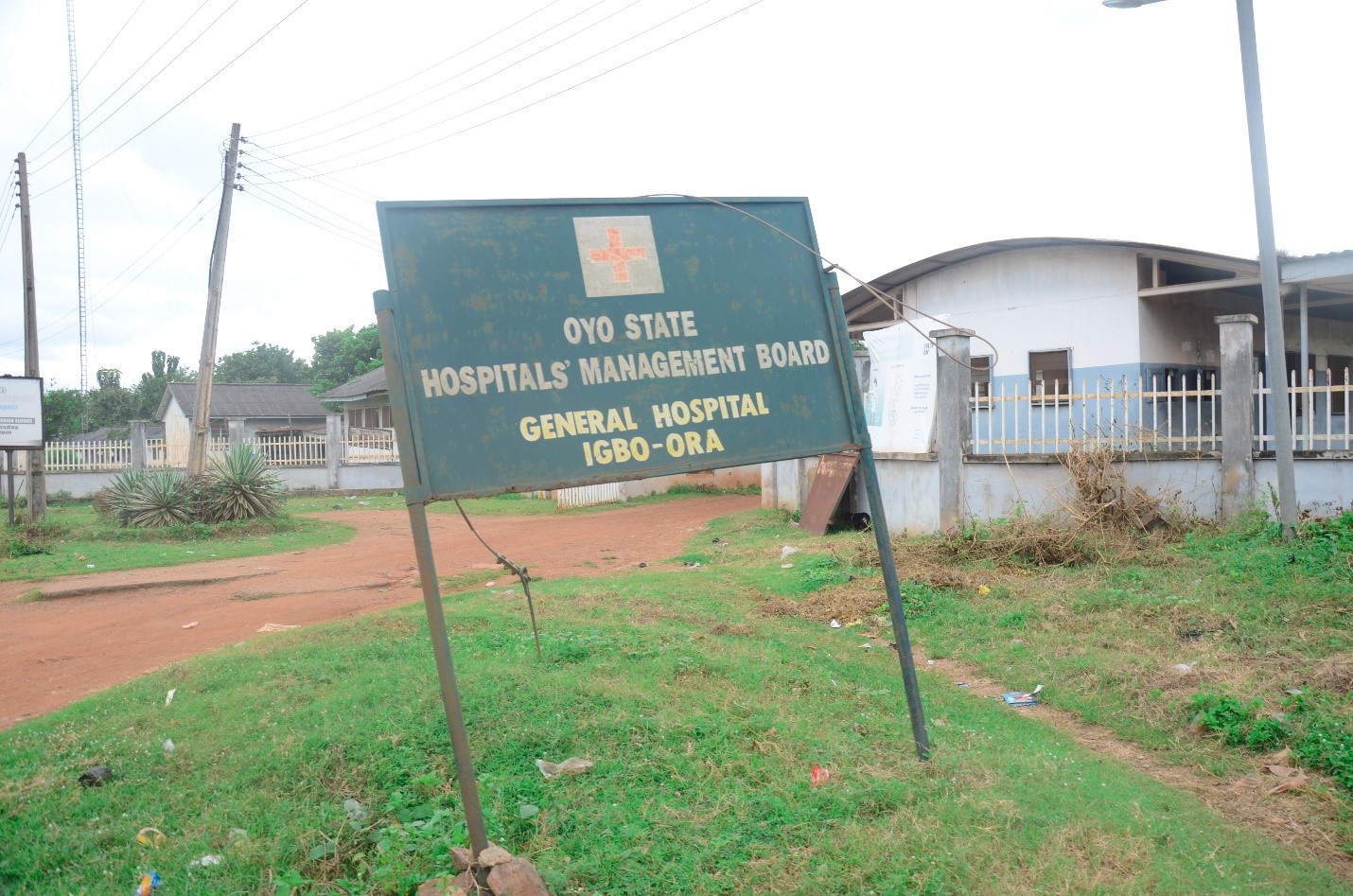
The News Report
Upon arrival at the Oyo State Hospitals’ Management Board General Hospital, Igbo-Ora, the Management Team was warmly welcomed by Dr. Ayodeji Adebayo, the Head of the Ibarapa Community Project, and other members of staff of the project who were present. Dr. Adebayo took the opportunity to personally introduce the workers in persons of Dr. Oluwafemi Popoola, the Coordinator of Studies on the Ibarapa programme, Dr. Akande, a Senior Registrar; Mr. Akande, an Executive Officer who also serves as a liaison officer; Mrs. Olayiwola and Mrs. Akintola, Higher Health Superintendents; Mr. Akinlabi, Executive Officer (Account); Mr. Ogunmuyiwa, a Library Assistant; Mr. Lawal, a Security Officer; Mr. Adebayo, a Security Officer; Mr. Jinadu of the Works and Maintenance Department; Mr. Salami, a Laboratory Scientist; Mrs. Okanlawon, an Office Assistant; and Mrs. Adetutu, a Therapist at the Dental Health Centre; Mr. Ogunnaike, Assistant Chief Record Officer, Mr. Muda, the Gardener, and Mr. Adetunji, Assistant Laboratory Scientist.
Dr. Adebayo also introduced the Provost and the Management Team to those present.
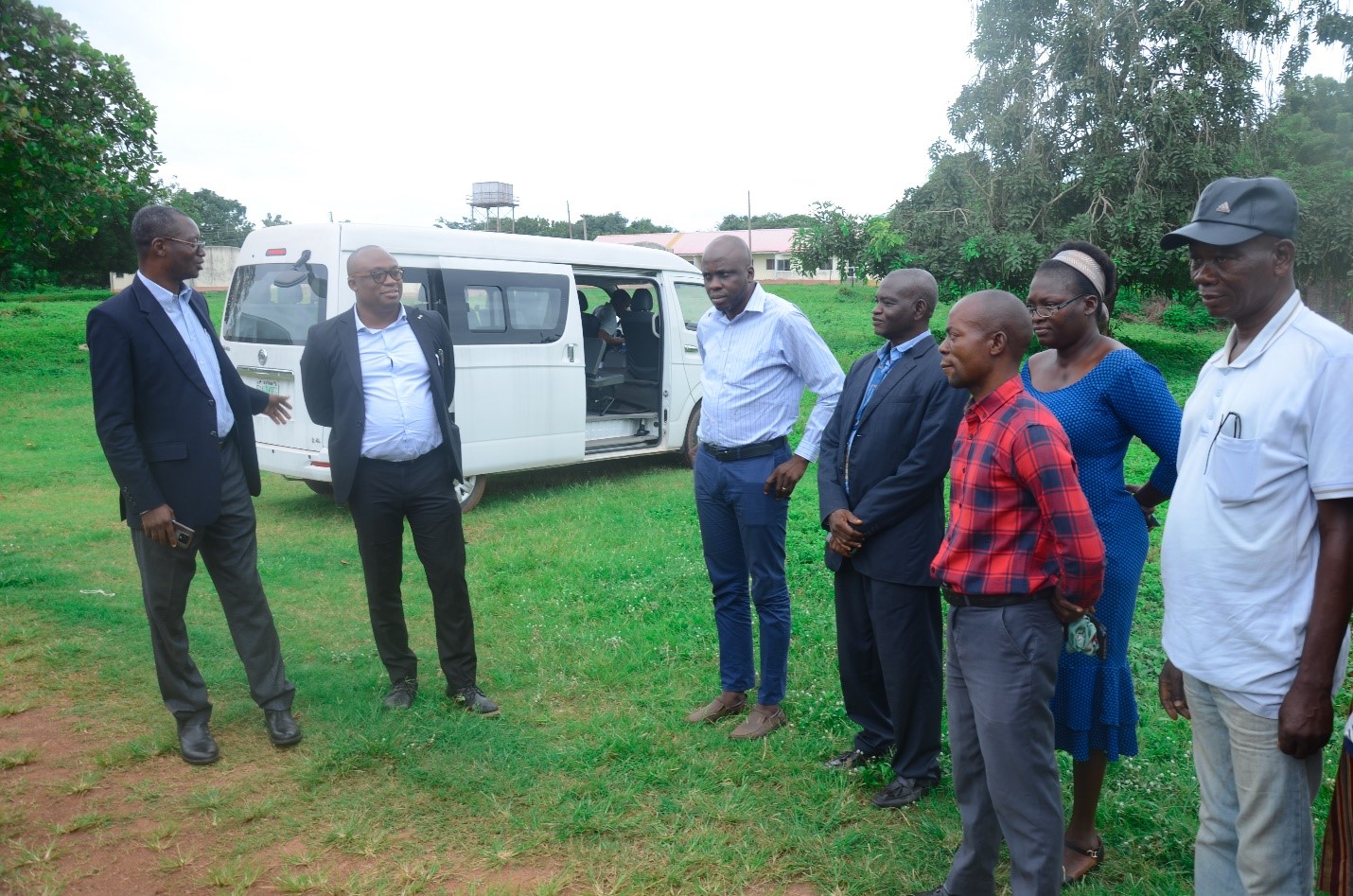
Dr. Adebayo introducing the College staff at the Ibarapa Community Project site in Igbo-Ora to the Provost and the Management Team during the visit.
The Provost, having participated in the Ibarapa Community Project herself, passionately addressed the staff reflecting on her experience at the site four decades ago. In her speech, she mentioned the eight-week-long exploit in research, community engagement, and amity with peers continue to evoke wonderful memories whenever she speaks of the project. She acknowledged that the visit, which had been long delayed owing to the COVID-19 pandemic and the past repeated security challenges in the area, is aimed at inspecting the condition of the site to guide the College management in enhancing the site’s image and elevate it to the status of a world-class research facility.
Afterwards, Dr. Adebayo led the team on a guided tour through departments and units on the site which availed the Provost the opportunity to engage both members of staff and students present on the site. During the tour, the Provost carefully assessed the condition of available facilities – dormitories, cafeteria, chalets, laboratories, buses, and the entire landscape. While she expressed her delight at the abundant natural resources and infrastructure in place, she lamented the present state of the facilities and underscored the urgent need for renovation like the renovated dormitory embarked upon by the MBBS/BDS Class of 1988.

The Provost, Professor Olayinka Omigbodun FAS, responds after Dr. Adebayo introduces the staff
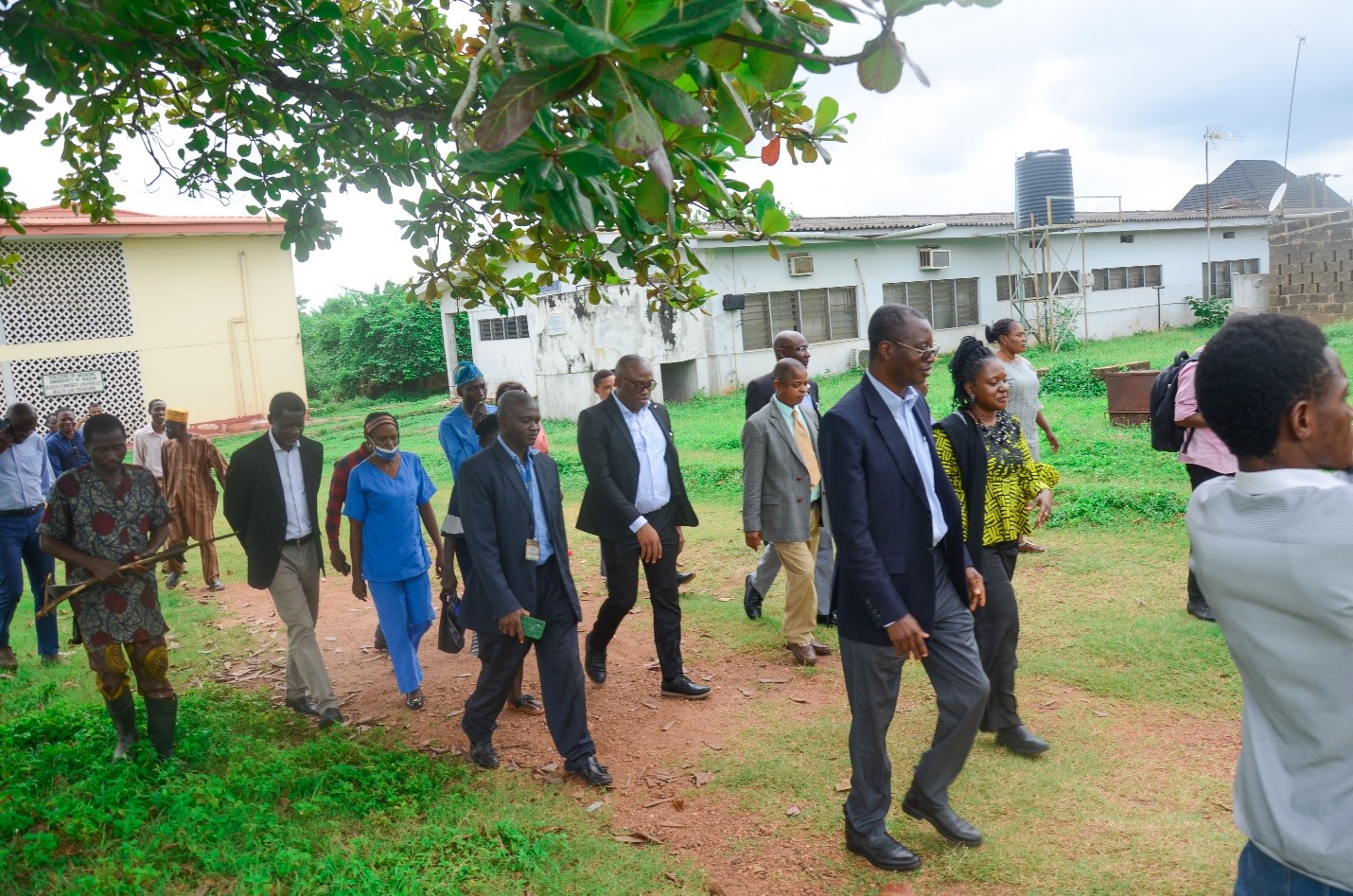
Dr. Adebayo leading the facility tour
The Provost also spared a minute to show everyone the room she stayed in during her time in Igbo-Ora in 1983. This moment amongst others is captured in the video report on our YouTube channel here: https://www.youtube.com/watch?v=FKGfXy7i4E4
Interaction with the Students…
In the course of the visit, the Provost had two sets of engagements with the students – a spontaneous feedback session from students on their experiences onsite and the potentials inherent in the host community, as well as an official roundtable discussion between the Management Team and the students.
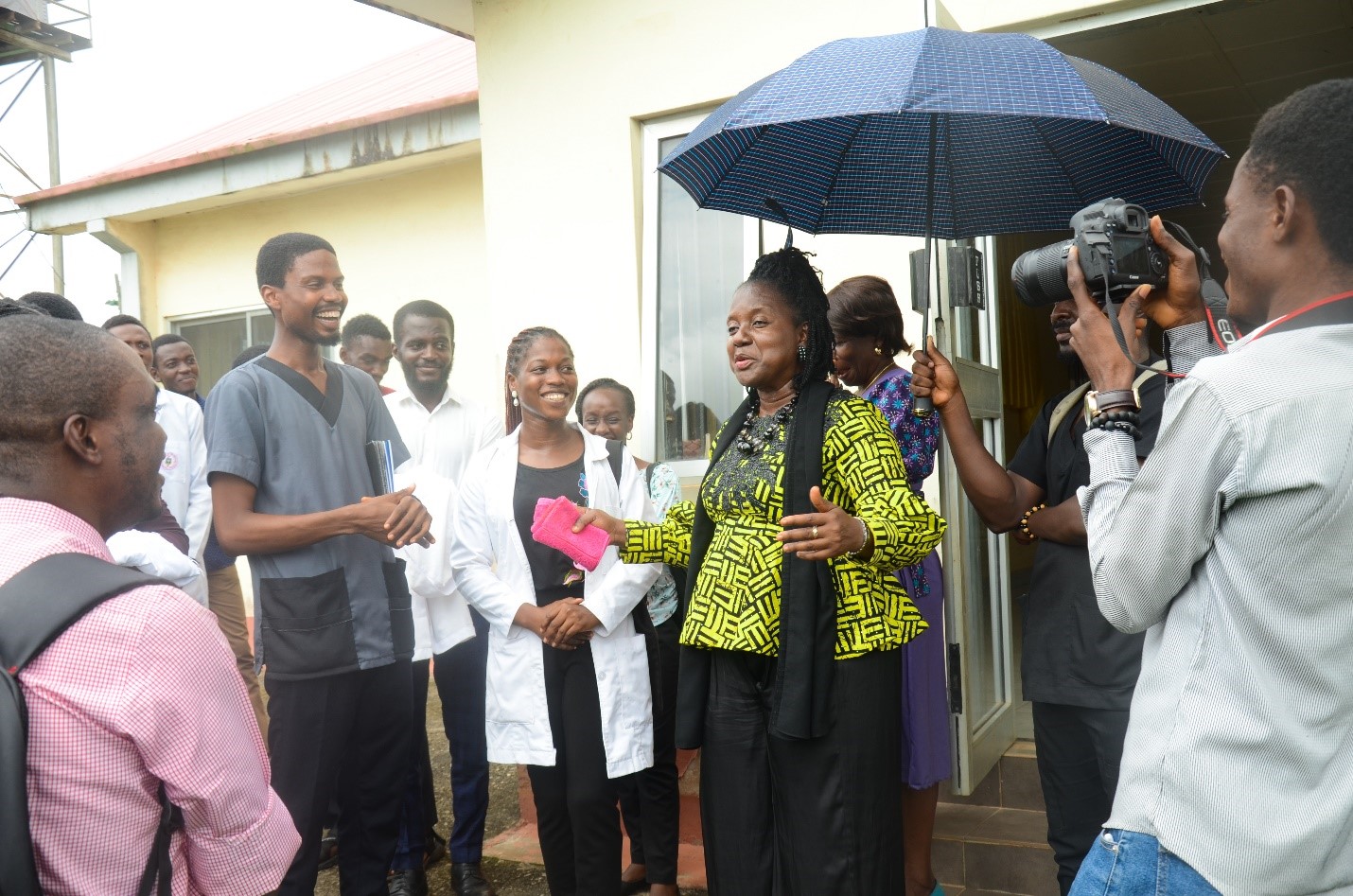
The Provost speaking to the students about their experiences in Igbo-Ora before spontaneously asking for the students to speak about the pros and cons of their stay so far in Igbo-Ora
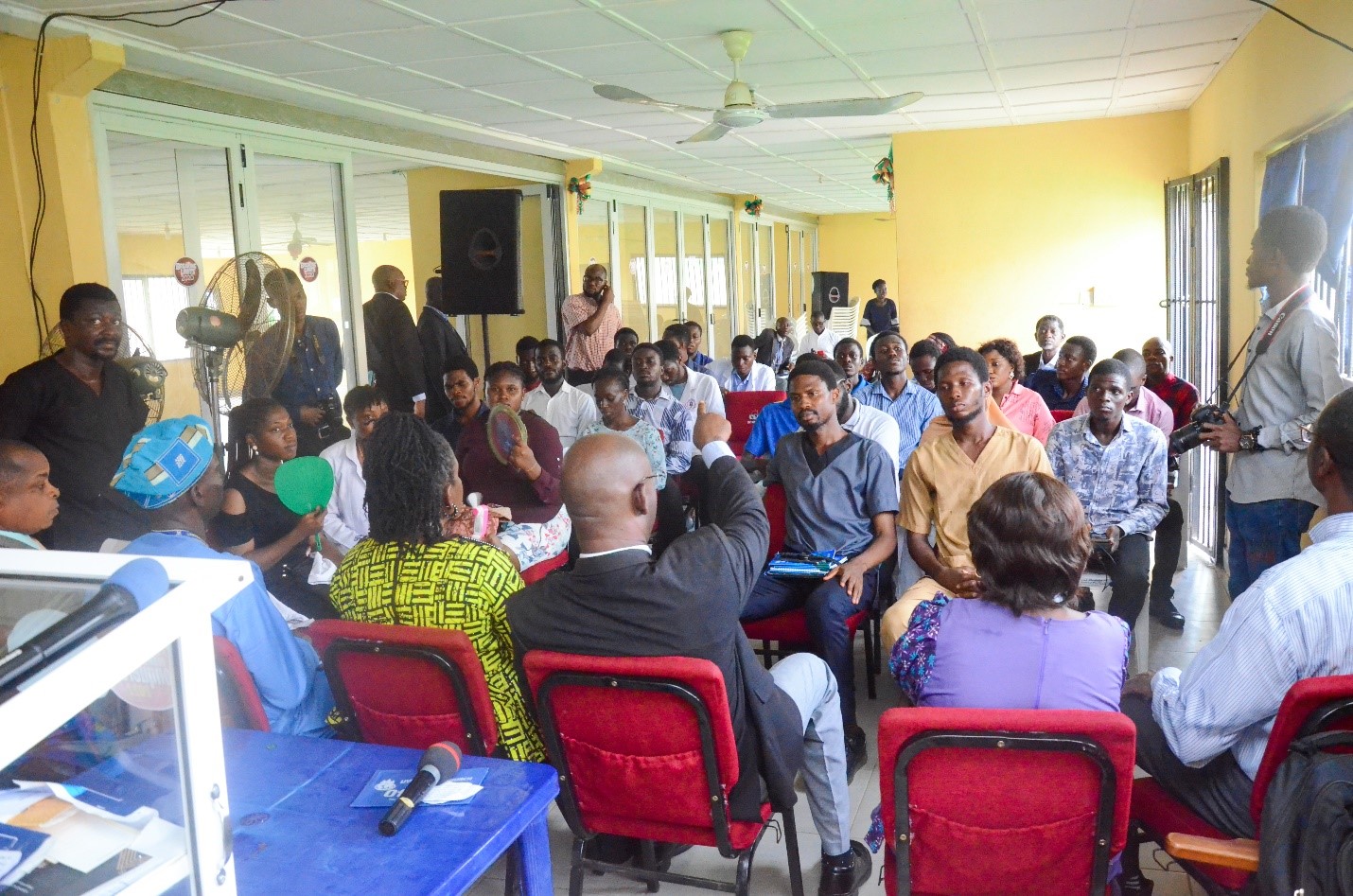
The Management Team in further discussion with the students
During both interactive sessions, the students expressed their joy at the opportunity to explore the serene environment and the untapped resources of the land. They consider their time in Ibarapa as a rare opportunity for personal retreat, renaissance, research engagements, and an opportunity for social impact. They commended the availability of the library which has served as a connection to generations of student doctors who had been part of the Ibarapa Community Programme.
However, the students lamented the virtual absence of electricity supply which poses a significant challenge. The students complained about not being able to charge their devices thereby disconnecting them from the outside world. Other challenges include overgrown bushes, dilapidated buildings, under-utilized facilities, dirty and run-down dormitories, inoperative cafeteria, cows grazing on the premises leading to a messy environment due to cow dung, shortage of water supply, and unstructured schedule of activities. In light of these issues, the students recommended addressing the electricity problem and better scheduling of outreaches for a more effective community impact.
Despite the difficulties that students were every enthusiastic about the posting and expressed great excitement about a large goat given to them from Kabiyesi which they were going to roast at a bonfire night on the last day of the posting in Igbo-Ora.
In response, the Provost assured that the Management team is committed to restoring the regular visitation routine and promised to implement measures for a smooth operation at the site. She emphasized that the multiple challenges being faced are also representative of the gap years of absent community posting, as the students were coming to the sites after almost three years of redundant work there.
A final Stop at the Oba’s Palace…
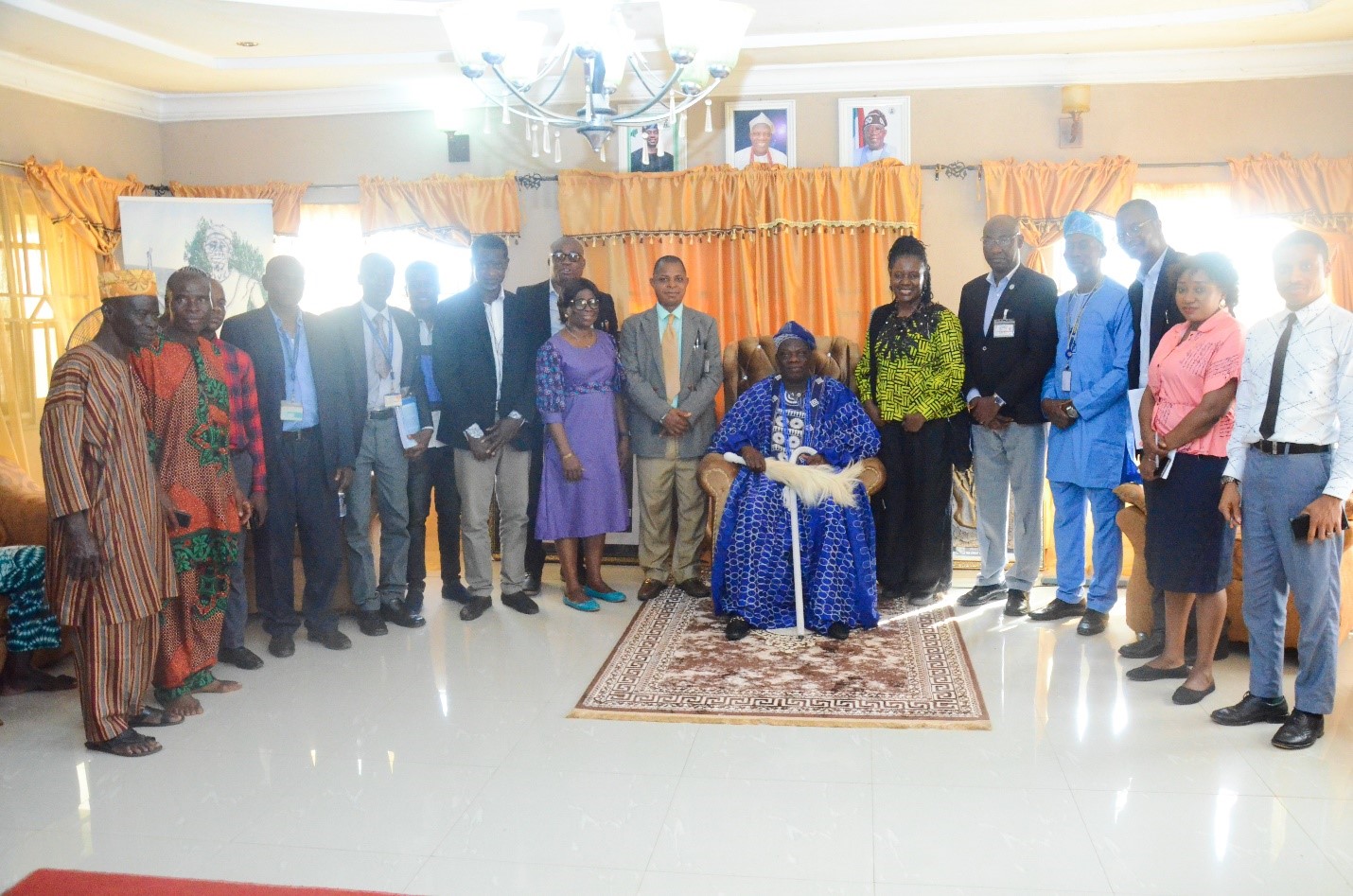
The visitation was concluded with a stop at the Olu of Igbo-Ora’s palace where the team was warmly welcomed by Oba Jimoh Olajide Titiloye and some of his chiefs. Dr. Adebayo led the introduction at the palace, appreciated Kabiyesi on behalf of the students, and acknowledged all that had been done to support the learning experiences of the students in Igbo-Ora.
The Provost seized the opportunity to inform Kabiyesi that research activities are fully resuming in the town. She shared her observations at the site with the Oba and encouraged him to reach out to sons and daughters of the land who have capital resources to invest more in the site and partner with the University to unlock the untapped potential of the vast project for it to become a world-class attraction. The Provost also highlighted the need for improved road networks leading to the town and the ones within the town. For this, she acknowledged and appreciated the Oyo state government on their ongoing efforts to rehabilitate the road, including the inclusion of a drainage system there. She then thanked the Oba for hosting the students and workers of the College of Medicine, Ibadan. She also thanked him for the gifts he had sent to the students.
As the meeting drew to a close, Kabiyesi also expressed his delight at the team’s presence and assured them of his unwavering support for the site’s development and the fulfilment of the programme’s goals. He also commended the state government’s efforts in improving electricity supply, enhancing security, and upgrading the road infrastructure, while encouraging the people to exercise some patience as positive changes are on the horizon. In his final words, the Oba urged the team to rekindle stakeholder meetings where challenges were typically addressed on the Ibarapa Community Project.
The Provost afterwards presented gifts to the King on behalf of herself and the Management team of the College. They departed after greeting the King the traditional way. The Management team were delighted to find that the Oba had arranged for sacks of fresh farm produce such as sweet potatoes to be placed in the bus that conveyed the team to Igbo-Ora. The team expressed their deep gratitude for the warm welcome and the wonderful fresh farm produce gift that the Olu of Igbo-Ora had given them.
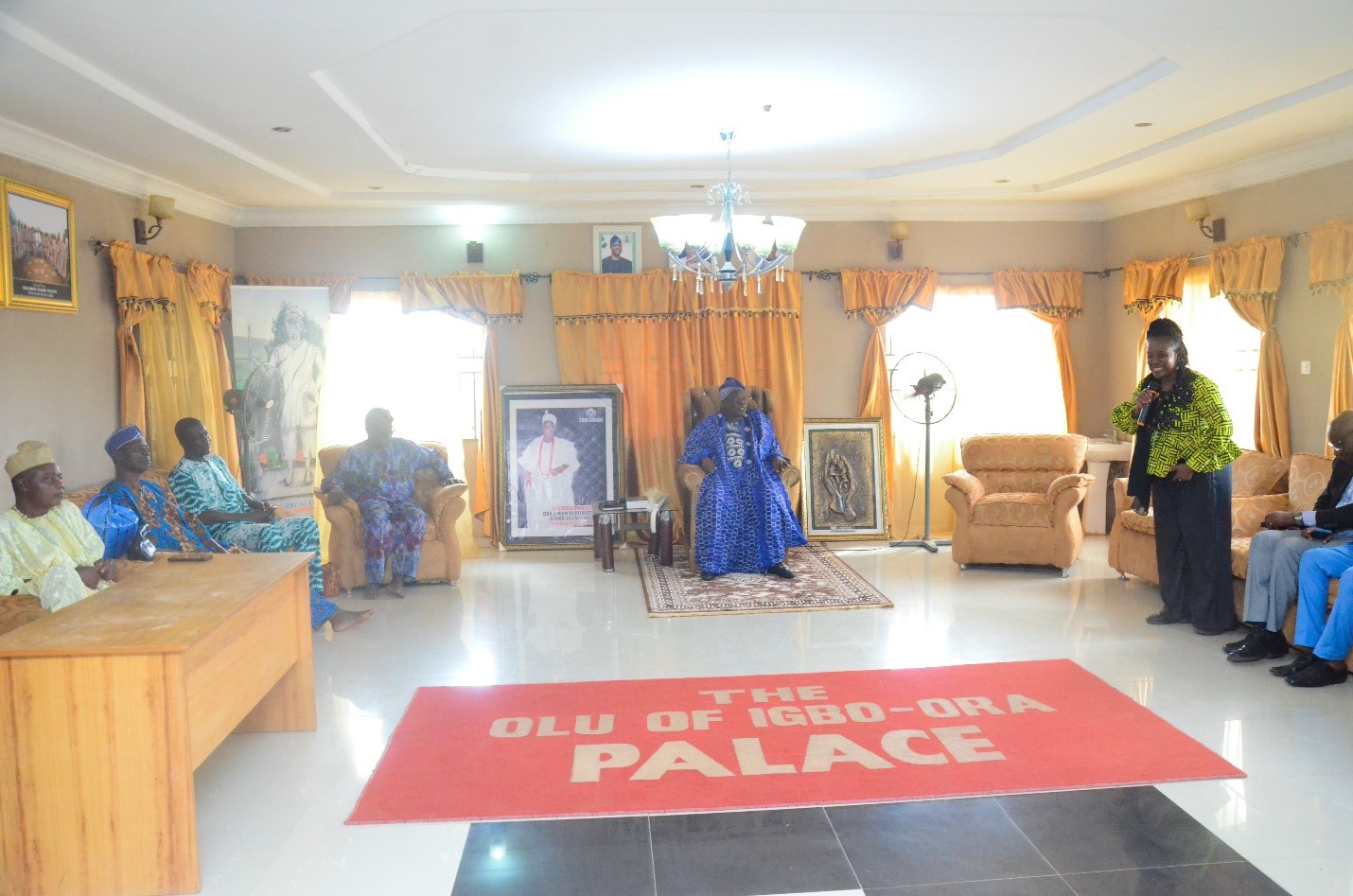
The Provost, Professor Olayinka Omigbodun FAS, while delivering her speech at the Oba of Igbo-Ora’s palace during the courtesy call to Oba Jimoh Olajide Titiloye
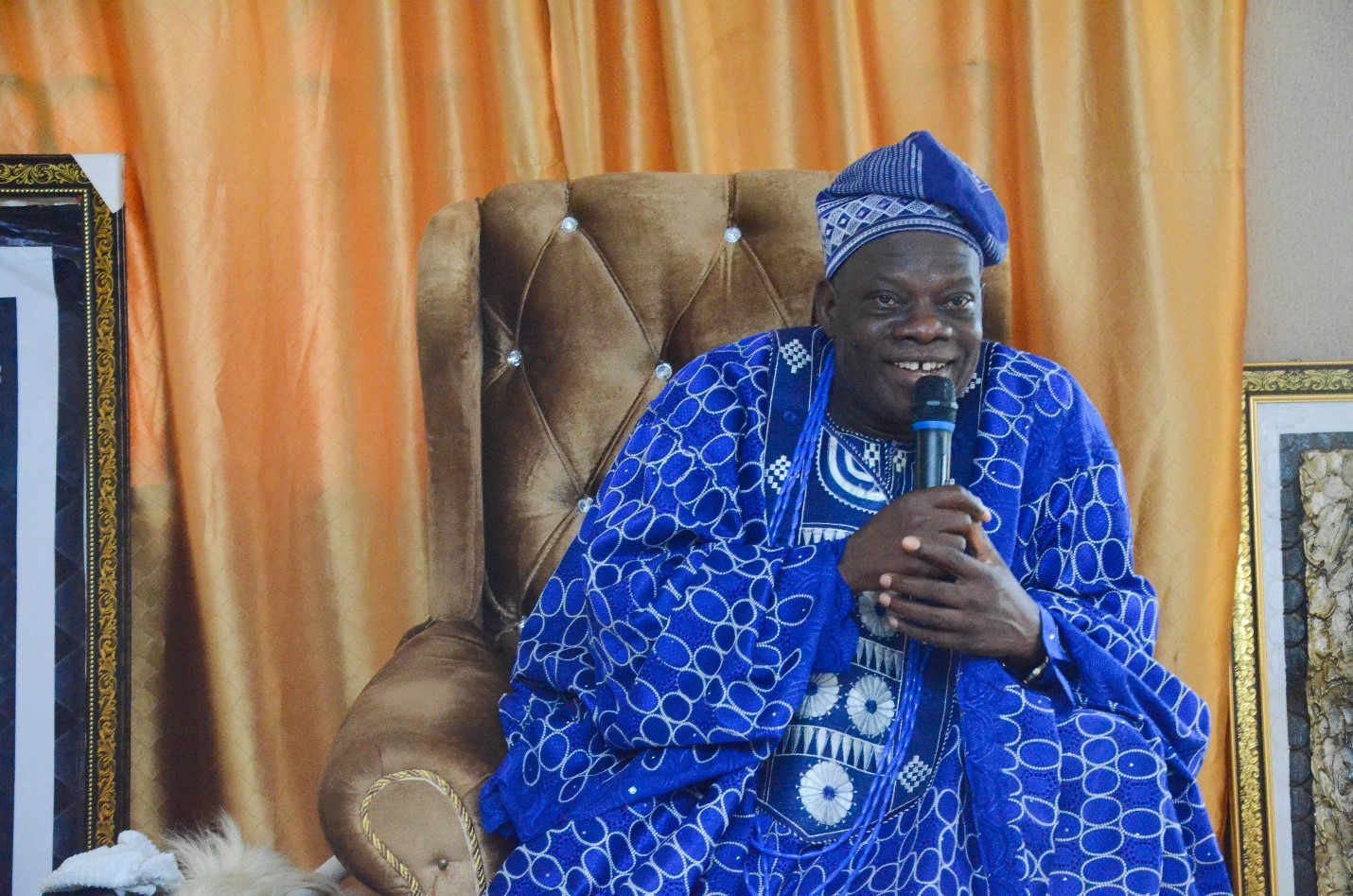
Oba Jimoh Olajide Titiloye during his address at the palace while responding to issues raised by the Provost
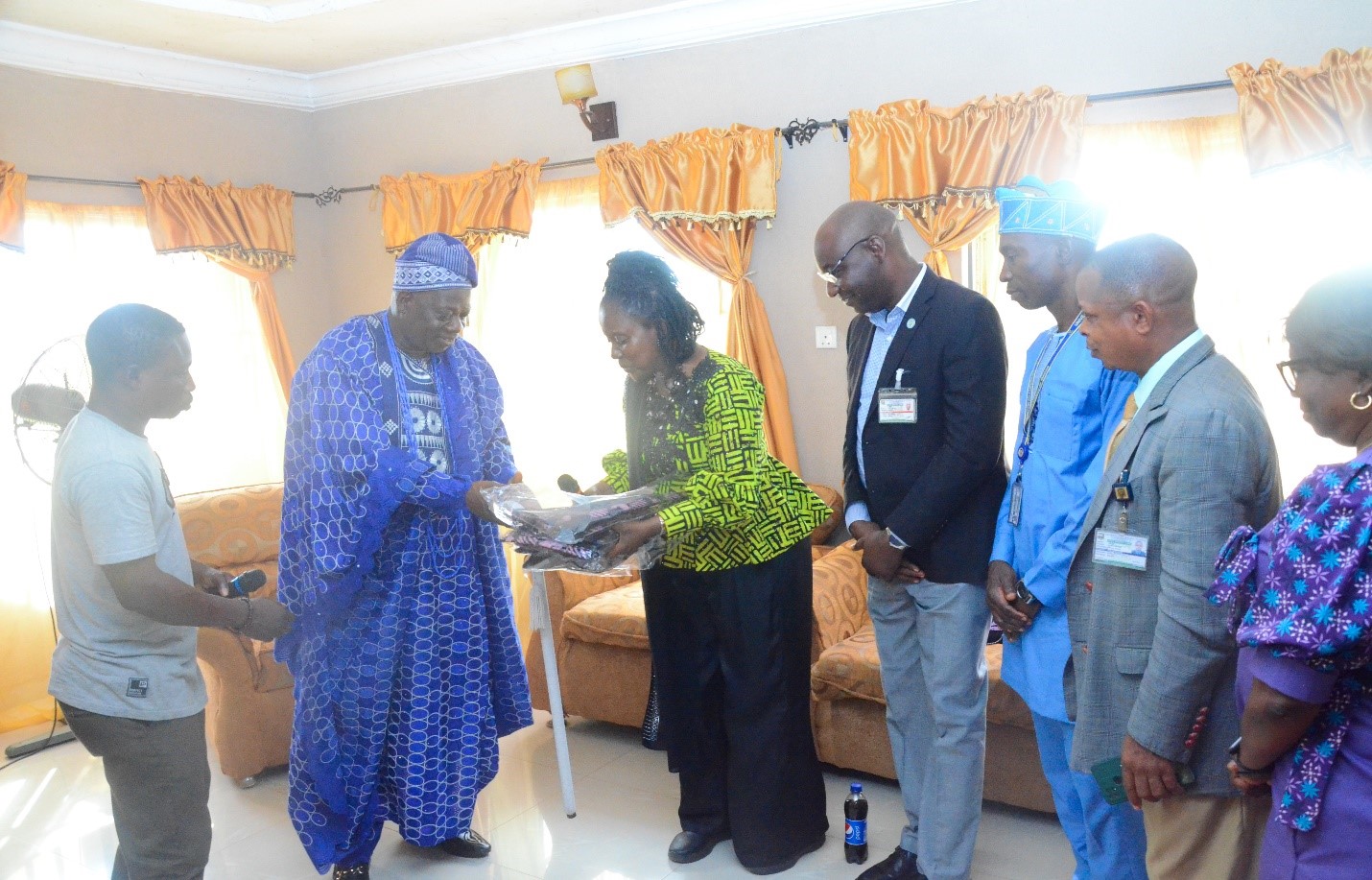
The Provost, in the company of the Management Team, presents UCH merchandise to Oba Jimoh Olajide Titiloye
The Talking Points
Throughout the journey, the team emphasized the objective of the courtesy visit to the Ibarapa Community Project, which was to conduct a comprehensive inspection, gain invaluable insights into the project’s status, and pave the way for future actions and developments.
This was why it was critical to articulate the specific challenges being currently faced:
- There are valid student concerns about challenges such as erratic power supply, overgrown bushes, dilapidated buildings, under-utilized facilities, inoperative cafeteria, grazing cows, water shortage, and an unstructured schedule of activities.
- Assessment of facilities by the Management Team such as dormitories, laboratories, buses, and overall infrastructure indicates that many of the infrastructures there are in the present state of disrepair and the urgent need for renovation.
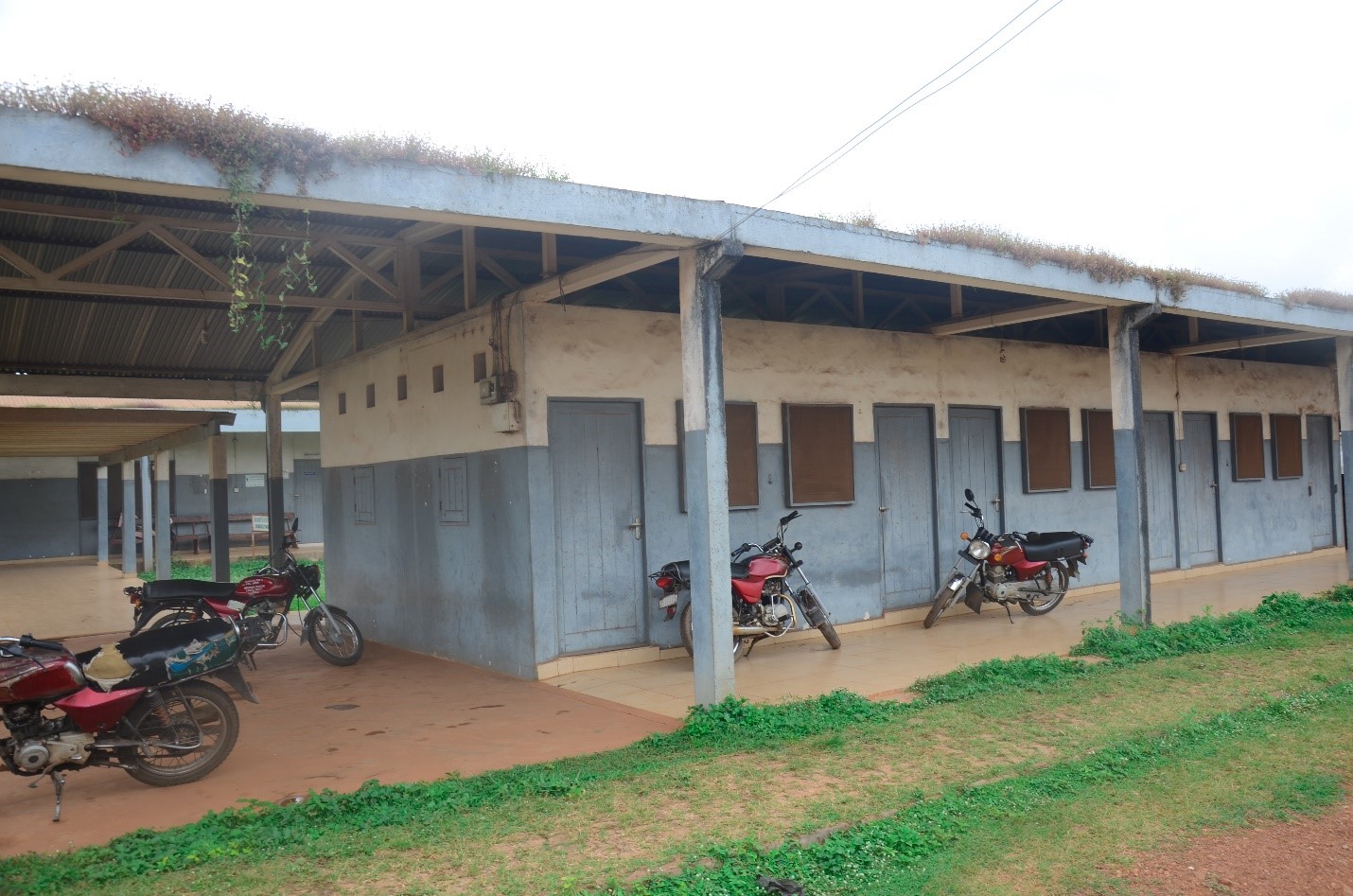
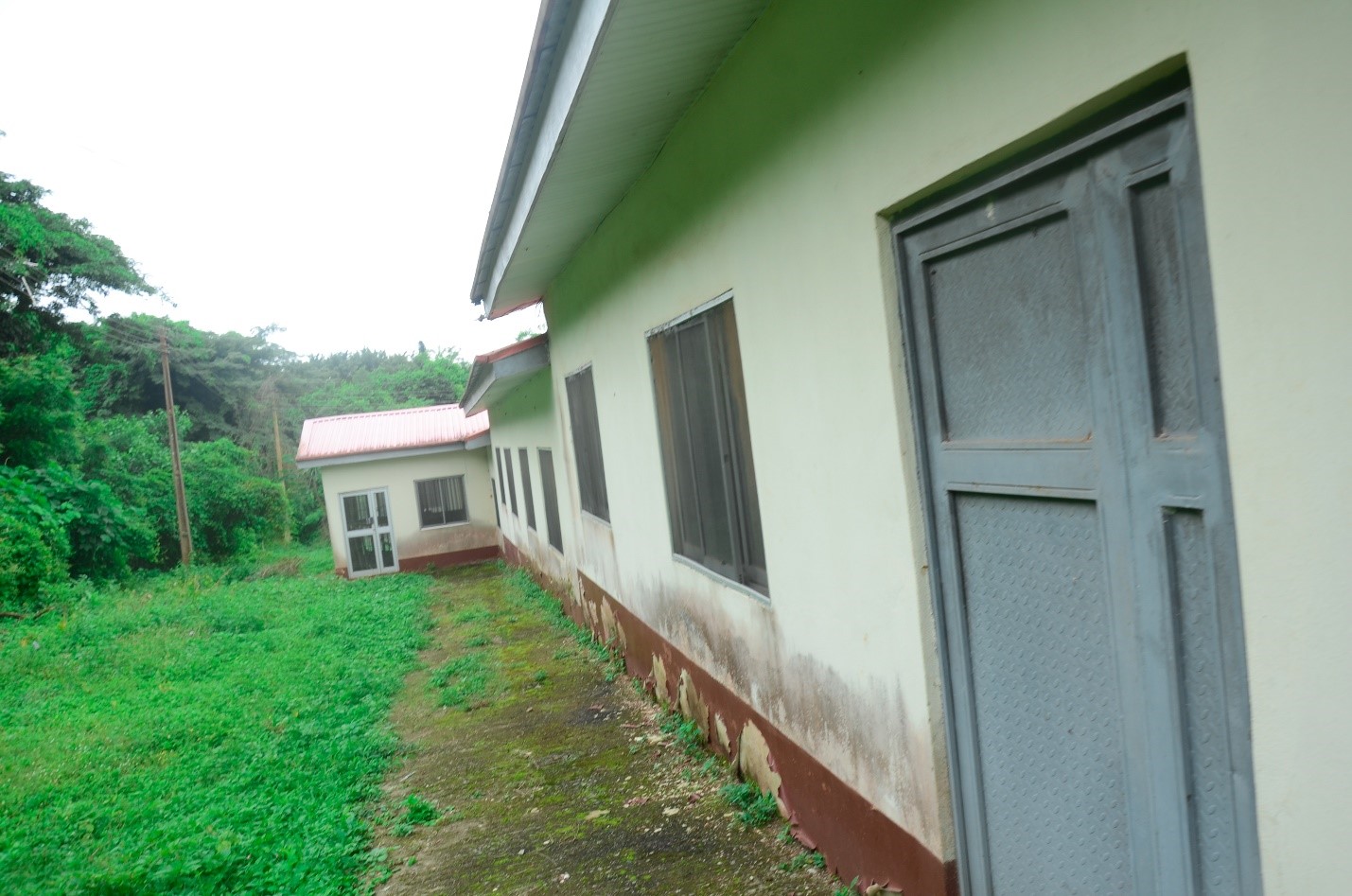
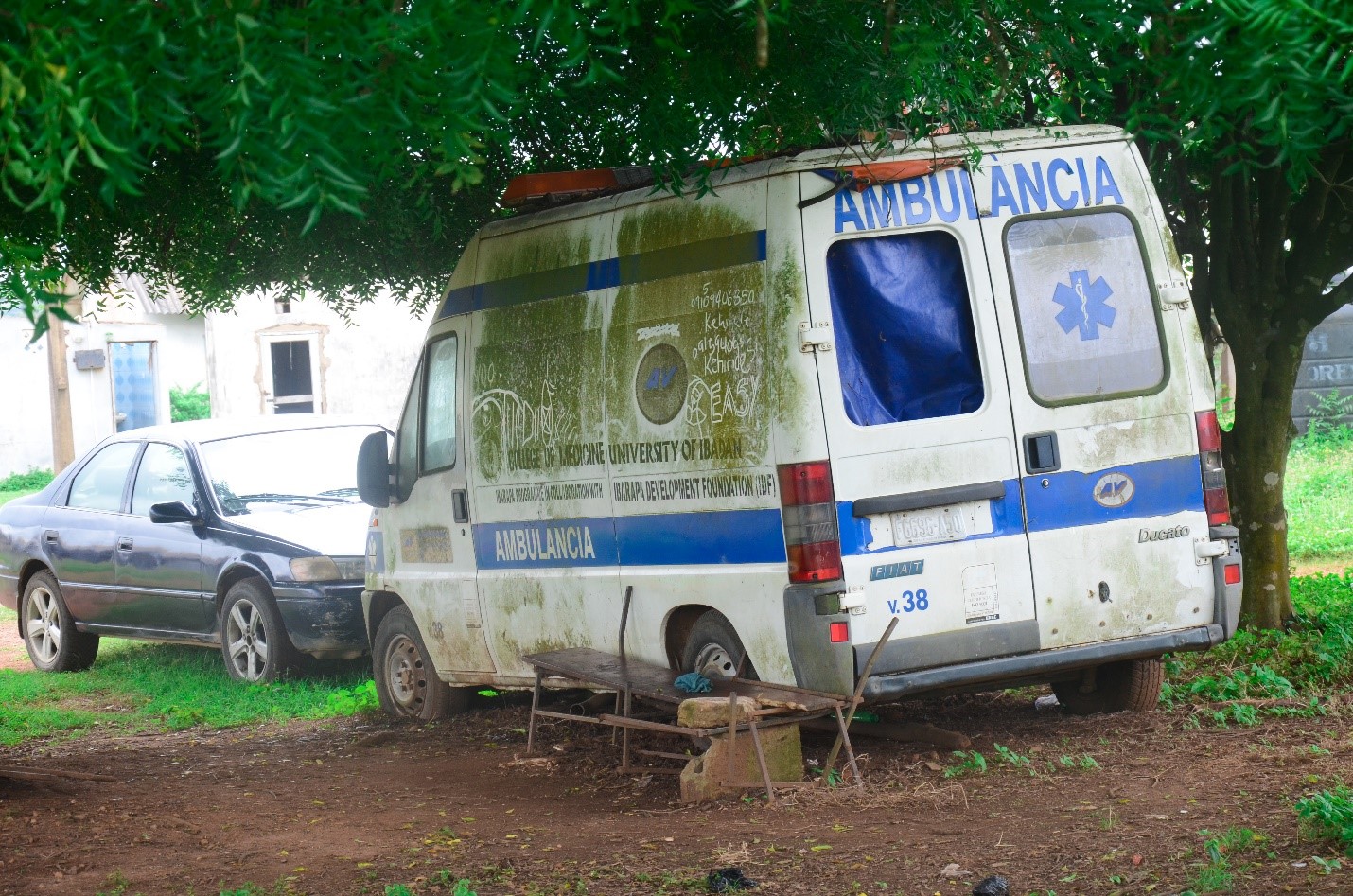
How Can We Tap the Vast Potential of the Ibarapa Community Programme?
The call for urgent action to improve the work and academic experiences of students and staff at the Ibarapa Community Programme is more significant than ever. There is a critical need for immediate steps to be taken towards improvement. First and foremost, the primary and immediate focus should be on prioritizing the restoration of facilities, aiming to enhance the overall appeal of Igbo-Ora to make the living experiences of staff and students better. This involves making the buildings and spaces more attractive and functional, following the positive example set by the MBBS/BDS Class of 1988 in their renovation efforts of one of the student dormitories.
More so, strategies must be devised and implemented to reinstate regular visitation routines. The interruption caused by factors like COVID-19 and security challenges is now a thing of the past, so efforts to ensure active community engagement and the continued success of the Ibarapa Community Programme must be led on all fronts.
To unlock Igbo-Ora's full potential, collaboration with potential investors and partners is essential. Engaging with individuals possessing capital resources presents a significant opportunity to contribute to the project's success and transformation. Furthermore, close collaboration with relevant authorities is crucial for the effective implementation of infrastructure development projects, including the sustained improvement of road networks which are already underway. This is vital for ensuring seamless operations and accessibility in Igbo-Ora. The emphasis is on encouraging those with the means to collaborate with the College of Medicine and her parent institution, the University of Ibadan, in exploring investment opportunities that can bring about positive change in Igbo-Ora.
During the visit to the Olu of Igbo-Ora's palace, the Provost highlighted the vast hectares of land owned by the University of Ibadan. She emphasized the potential for development to further enhance research activities. Moreover, the Provost envisioned the site as a potential resort, if the abundant greenery, lush vegetation, and serene environment can be fully leveraged and the vast land secured. Within the land, there were hundreds of cashew nut trees a potential resource if tapped properly. With the renovation of chalets, the site could offer live-in experiences for weekend getaways, writing, research, or management retreats, amongst other possibilities. This a is haven, that would attract staff and students from all over the world who want to experience the numerous aspects of the programme.
This multifaceted approach to development will not only transform Igbo-Ora into a thriving research hub for the College of Medicine and her parent institution, the University of Ibadan, but also create a picturesque destination for various purposes for the host community.
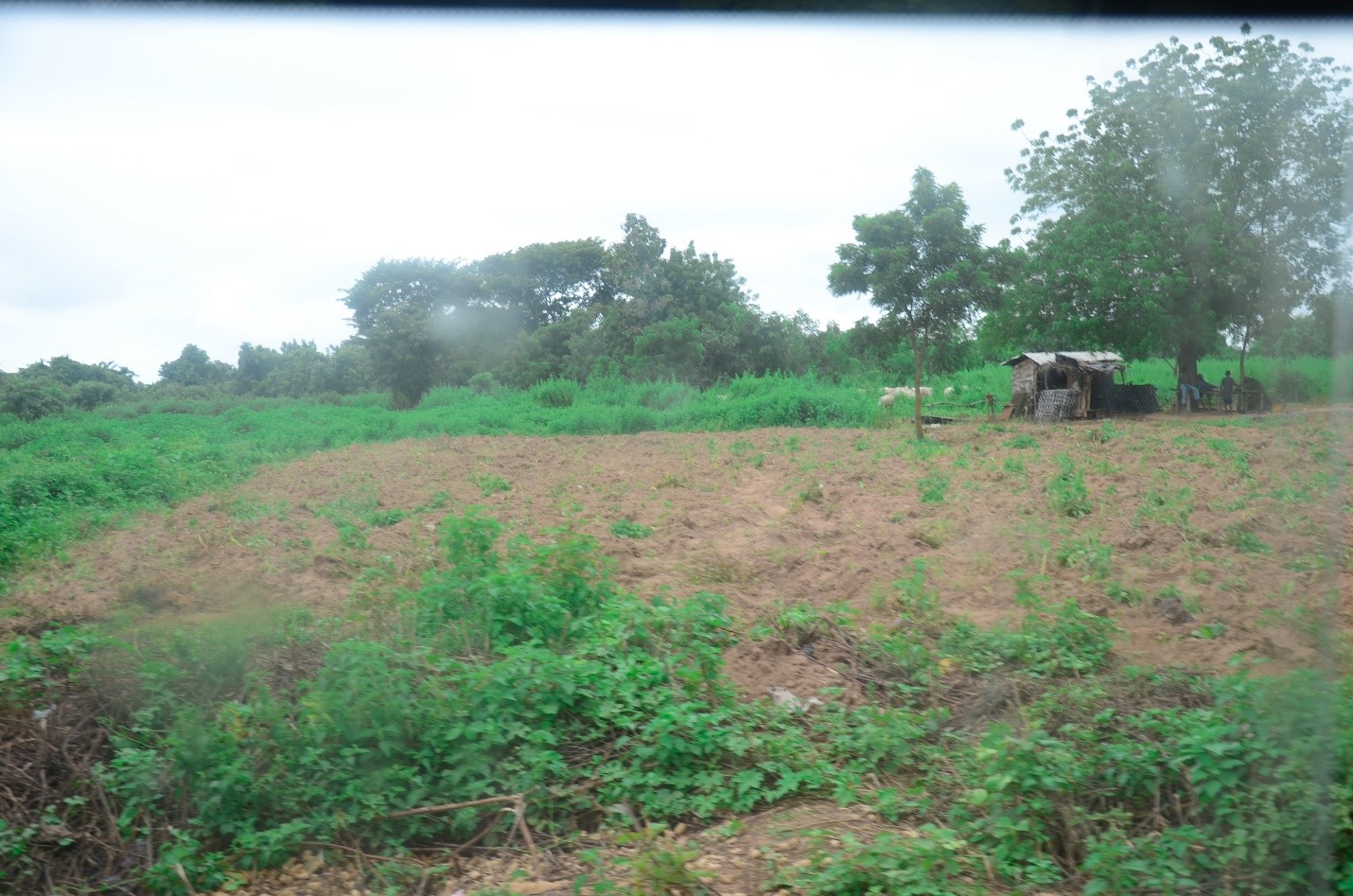
A partial glance of some parts of the 43.065 hectares of land belonging to the University of Ibadan at the heart of Igbo-Ora
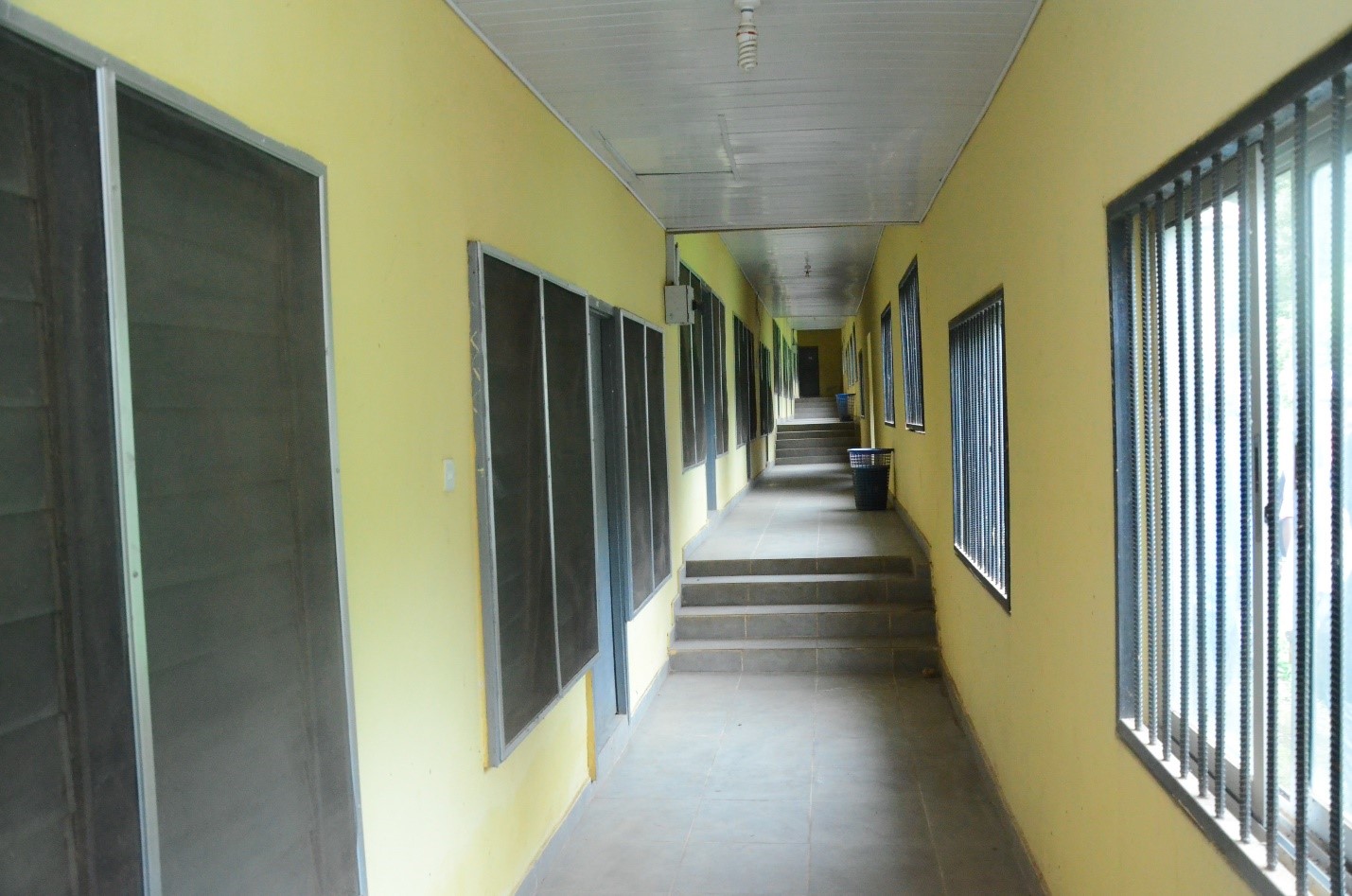
The hallway view of the students’ dormitory that was refurbished by the MBBS/BDS Class of 1988


